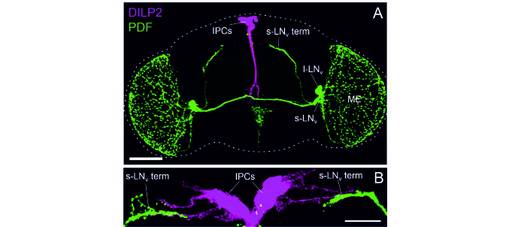
New paper published: Signals from the circadian clock trigger overwintering strategies in insects
Pubblicato il: 02.07.2019 14:24
Signals from the circadian clock trigger overwintering strategies in insects
D. Nagy, P. Cusumano, G. Andreatta, A. Martin Anduaga, C. Hermann-Luibl, N. Reinhard, J. Gesto, C. Wegener, G. Mazzotta, E. Rosato, C.P. Kyriacou, C. Helfrich-Förster, R. Costa
Adult Drosophila melanogaster females overwinter by inducing a reproductive arrest characterized by the inhibition of ovarian development at previtellogenic stages. The insulin producing cells (IPCs) are key regulators of this process, since they release insulin-like peptides that act as diapause-antagonizing hormones. A challenging question is how the environmental signals that trigger dormancy, including putative timing information, are perceived, interpreted, and converted into hormonal signals within the brain. Here we show that in D. melanogaster circadian clock neurons activate the IPCs and inhibit reproductive arrestvia two neuropeptides, the Pigment Dispersing Factor and short Neuropeptide F. We also demonstrate (Figure, panel B) that axonal projections from the circadian clock neurons (green) physically overlap with projections from the IPCs (magenta), thus implying that clock neurons signal to the IPCs.
These data shed light on the neurogenetics of the circadian-overwintering axis.
Full paper at https://www.ncbi.nlm.nih.gov/pubmed/31194738
More on our labs and latest news at www.sleeprhythm.org;www.neurogeneticsleicester.com; @FlyNeuro; @RhythmSleep





